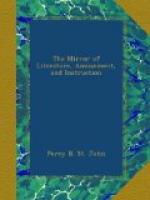It opens with the History of Coffee, from its discovery by a monk in the 17th century, to the establishment of cafes in Paris, of which we have a brief notice, with additions by the translator.
Next is “the French method of making coffee, with the roasting, grinding, and infusion processes”; and an interesting chapter on “coffee in the East.” Under the “medicinal effects” we have the following, which is full of the gaiete de coeur of French writing:—
Influence of Coffee upon the Spirits. If coffee had been known among the Greeks and Romans, Homer would have taken his lyre to celebrate its virtues; Horace and Juvenal would have immortalized it in their verses; Diogenes would not have concealed his ill-humour in a tub, but would have drunk of this divine liquid, and have directly found the honest man he sought for; it would have made Heraclitus merry; and with what odes would it have inspired the muse of Anacreon!
In short, who can enumerate the wonderful effects of coffee!
Seest thou that morose figure, that pale complexion, those deadened eyes, and faded lips? It is a lamentable fit of spleen. The whole faculty have been sent for, but their art is unavailing. She is given over. Happily one of her friends counsels her against despair, prescribes a few cups of Moka, and the dying patient, being restored to health, concludes with anathematizing the faculty, who would thus have sacrificed her life.
The complexion of this young girl was, as the poets would say, of lilies and roses; never was there a form more celestial, or one more gifted with life and vigour.
Arrived at this stage, so fatal to the existence of females, the young girl sickened, lost her colour, and those cheeks, but yesterday so brilliant, were dull and heavy. “Travelling,” said one; “a husband,” said another; “coffee, coffee,” replied a doctor. Coffee flowed in abundance, and then the drooping flower revived, and flourished again.
O! all ye who have essayed at rhyme, say if you have not often derived your happiest thoughts from this inspiring beverage. Delille has some beautiful lines, and Berchoux, in his poem of Gastronomie, has a pompous eulogium on its virtues.
Coffee occupies a grand place in the life and pursuits of the gastronomer. Oft-times on leaving table his head aches and becomes heavy; he rises with pain; the savoury smells of viands, the flame of wax-lights, and the imperceptible gases which escape from innumerable wines and liqueurs, have produced around him a kind of mist or shade, equal to what the poet calls darkness visible. Coffee is quickly brought; our gastronomer inhales the aroma, sips drop by drop this ambrosian beverage, and his head already lightened, he walks with his accustomed vigour. What gaiety smiles in his countenance! the liveliest sallies of wit flow unnumbered from his lips; he is another being—a new man; but coffee alone has produced this regeneration. The late Doctor Gastaldi, who was an excellent table companion, used to say that he should have died ten times of indigestion if he had not accustomed himself to take coffee after dinner.




